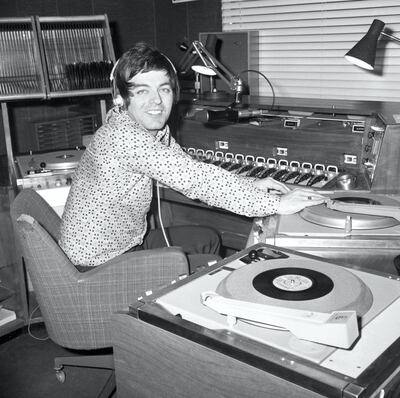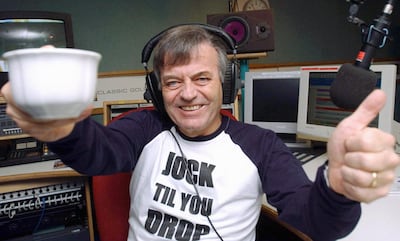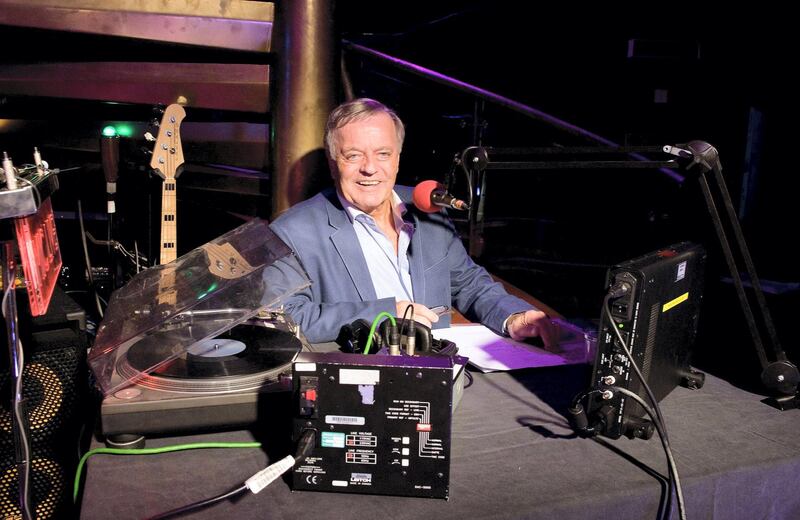"Have you seen The Boat That Rocked?" replies Tony Blackburn when I ask him about the pirate radio ships, which broadcast pop and rock music from international waters off the east coast of England during the 1960s. "Well, it was nothing like that." How disappointing. Richard Curtis's 2009 film suggested it was pretty much non-stop debauchery out there in the North Sea. "If it had been like that we'd all still be there," laughs Blackburn, who had a show on pirate stations Radio Caroline and Radio London, which were set up to challenge the BBC's monopoly.
But even if the atmosphere on board was more sedate than we’ve been led to believe, life at sea was turbulent enough. Blackburn recalls getting shipwrecked one night off the coast of Essex. “It was force 10 gales,” he says. “I was in bed when someone woke me up and said, ‘We’re coming into land.’ I went up on deck, the captain shone a torch and we could see people walking along the seafront about 100 yards away. Then there was a crunching noise.”
A cup of tea at the local police station followed before everyone was released without charge, since broadcasting from international waters is not illegal. Needless to say, the team headed straight back out the following night. “It was great fun, I loved every moment of it,” says Blackburn. “I was very proud to have been a part of it because it did alter everything in broadcasting history, really.”

You might very easily say the same about Blackburn. In 1967, he launched BBC Radio 1 by playing The Move's Flowers in the Rain and more than half a century later, you can still hear his voice across the airwaves, a little more gravelly now, perhaps, but as chipper and reassuring as ever. Blackburn is part of that select group of DJs, along with the likes of John Peel and Annie Nightingale, who define BBC radio. "I'm very proud to work for the BBC," says Blackburn. "Without it, the world would be a sadder place."
Blackburn still has a regular slot on BBC Radio 2, as well as a number of regional BBC stations, and he has recently been given a show on Emirates Airline’s in-house entertainment system. “The best airline I’ve ever flown with, I think,” he says, ever the professional.
One of the odd things about radio DJs is that they never seem to age. As listeners, we only ever hear them; we don’t tend to see how the passing of time has creased the forehead and sagged the cheeks. But if the voices stay largely the same, the world continues to change. The different ways in which we consume music today has made it harder for radio stations to retain their audiences. The emergence of podcasts and music streaming apps, such as Spotify, means there is no longer any guarantee that millions of people will simply wake up each morning and switch the radio on.
"Among the older generation, we've still got a big, big audience that listens to the radio but when that audience dies, I don't know [what will happen]," says Blackburn. He relishes the challenge, though. "I'm 76, but I love technology. It really excites me the way things have gone. There's no such thing as ordinary radio anymore, you can listen anywhere, so it's a complete revolution."
Not that Blackburn is administering the last rites to traditional radio just yet. "I think there will still be a need for live broadcasting, particularly speech radio," he says. "Radio will continue forever, more or less, but it's the way people consume it that will change."

You only have to glance at the figures, though, to appreciate the size of the challenge facing traditional radio stations. When Blackburn was hosting the Radio 1 Breakfast Show from 1967-1973, he would regularly attract more than 20 million listeners each morning. By the end of Nick Grimshaw’s reign last year, that number was closer to five million. New host Greg James has overseen a small spike, but the young people the BBC wants to attract are proving elusive.
“They’ll find it very difficult,” says Blackburn. “Kids go their own way, they don’t want to be told, ‘You should be listening to this or that.’ Until recently, particularly in television, the BBC had it all their own way. [But] a small revolution is going on and it’s a matter for the people [at the top] to try and fight. Good luck to them.”
And has Blackburn heard James’s Breakfast Show? Perhaps we can squeeze a few words of advice out of the old pro. Not a bit of it. “No, I’m not a listener,” says Blackburn. “If I was, I think they’d be doing something wrong, it’s not aimed at my age. I think they’ll be very happy to know that I don’t listen to it.”
Blackburn was one of the regular hosts of BBC One's televised chart show, Top of the Pops, in the 1970s and his enthusiasm for new music remains undimmed. He mentions Alicia Keys, Calvin Harris and Dua Lipa and is quick to remind me that, although we look back at the 1960s and '70s as something of a golden age for music, this is partly because we only play the good stuff today. "A lot of real rubbish came out in the '60s as well," says Blackburn. "But we forget about that. I'd never say, 'They don't write songs like they used to.'
“There’s still a lot of talent around, probably more now than ever before, particularly with all these reality shows.” Blackburn’s only gripe is that some of today’s music is overproduced. “All the singers are beginning to sound the same,” he says. “One person gets an idea and they all copy it.”
One singer Blackburn is not willing to talk about, however, is Michael Jackson. Our interview coincides with the Channel 4 release of Leaving Neverland, a documentary in which two men allege that they were sexually abused by Jackson as children. A number of radio stations announced that, in light of the allegations, they would no longer play Jackson records. "I don't really want to get involved in that side of it," says Blackburn. "I love Michael Jackson records, he's a wonderful artist but [whether or not we play his records] will be decided for me."
It’s a strange admission for a DJ to make, particularly one whose career has been built on the records he plays and the musicians he promotes. But perhaps diplomacy is the key to longevity in this industry.







